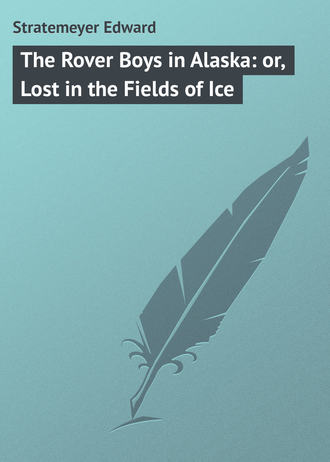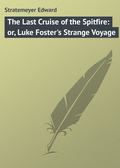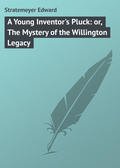
Stratemeyer Edward
The Rover Boys in Alaska: or, Lost in the Fields of Ice
CHAPTER XXX
GOOD-BYE TO ALASKA – CONCLUSION
"Is that your sled?"
"Yah. Vait, I vos sthop dem!" yelled Gus Schmidt, and with a dexterity that was really marvelous he turned his own team about and in a few seconds was traveling after the runaways.
"Wait! I'm going to get off! To look for my brother!" cried Dick, and as the German slackened his speed for a few seconds, the oldest Rover boy sprang out in the snow. He went sprawling, but was not injured. Almost before he knew it, the two sleds had disappeared and he was left alone.
All around him were the vast and mysterious fields of ice and snow. Far off he could hear the barking of the dogs, but this soon died out, and then came utter silence – a silence that seemed to fairly weigh him down. And now the snow started to come down harder than ever.
Had Dick Rover been less stout-hearted than he was he would have then and there given up the hunt for his brother. But Dick had the stuff of a real hero in him, and he went forward through the snow, bending low to escape the wind and to keep his eyes on that slowly disappearing trail.
Thus half an hour went by, and by that time, weighed down as he was by his heavy clothing and heavy footwear, Dick was well-nigh exhausted. He stopped to rest and to get his breath, and then, struck with a sudden idea, let out that old familiar locomotive whistle of Putnam Hall fame.
He waited for a few seconds and then whistled once more. Was he mistaken, or did an answering whistle sound out? He could not tell. He set his face grimly and trudged on.
At last he could see the trail no longer and then he realized the truth of the terrible situation.
He was lost on this vast field of ice and snow!
And Tom, somewhere ahead, must be lost, too!
It was a thought to make the stoutest heart quake. But Dick did not think of himself. He was thinking only of his brother. How could he locate Tom and save him from the cold and from starvation?
"I've got to do it!" he told himself, over and over again. "I've got to do it! I must! I must!"
On and on he plunged, and suddenly went sprawling over some object half hidden in the falling snow. He felt around, and realized that he had come upon the two packs that had been on the sled Tom had taken.
"If they fell off here maybe Tom fell off, too!" he told himself. And then he commenced to search the vicinity carefully.
It was well that he did this, otherwise he might have missed poor Tom, who lay in a slight hollow, partly covered with snow. The sled had hit a rock and the poor youth had been flung out with great force, landing on one shoulder and on his head.
"Tom! Tom! Are you alive? Answer me!" cried Dick, as he raised his brother in his arms. But no reply came from Tom's lips. He was unconscious.
With all the strength that remained to him, Dick carried his brother to the spot where he had found the traps. Then he quickly undid the bundles, to see if there was anything there he might use. He found a tiny oil stove, filled with oil, and lit it, and then rolled Tom in two blankets, and gave him something hot to drink. Then he found a stick of wood, soaked it well in oil, and set it up in the ice as a torch.
All this while Tom lay like a log. He was breathing heavily, but he did not open his eyes or speak. Evidently the shock had been a heavy one. Dick did not know but what some of his brother's bones might be broken.
An anxious hour went by, and in that time Dick did all he could for Tom, who still laid in a stupor. Then came a shout, and Gus Schmidt appeared, driving his dog team and with the runaway team also in harness. Behind the first sled was the second – the one Tom had taken.
"So you got your brudder, hey?" said the German. "How vos he?"
"In bad shape, I'm afraid," answered Dick, soberly. "I guess the dogs ran away and pitched him overboard."
"I dink you vos right, und da drow dem dings oferpoard, doo," and Schmidt, pointed to the traps. "Veil, it's goot ve got der draps und er sled pack."
"Can we get back to the others tonight?"
"Nein, it was too dark und cold. Ve go in der morning, to Riss Rifer. Maybe dare you got a doctor, yah."
So it was settled, and the German proceeded to make himself and the others as comfortable as possible. He prepared something to eat, and suggested that Tom be given a little broth, made out of some dried meat. This was done, and presently the sufferer opened his eyes and tried to sit up.
"Whe – where in th – the world am I?" he asked, in a faint voice.
"Tom, you're all right," answered his brother, soothingly. "Do you know me?"
"Why, of course I know you," came the wondering answer. "What happened to me, Dick?"
"You ran off with a dog sled and got a nasty tumble."
"A dog sled? Dick, you are stringing me? Who's got a dog sled around Brill?"
"Never mind, Tom, just keep quiet. You're very sick. Just rest yourself."
"All right." Tom heaved a deep sigh. "Gosh! I do feel pretty bad!" he added. He had tried to sit up, but now fell back exhausted.
It was a night never to be forgotten. The German snored peacefully, but Dick did not close his eyes. He watched Tom closely, to do all he could for his brother and make certain that the sufferer should not get away again.
During the night it stopped snowing and in the morning the sun came out as brightly as ever. Dick was astir early, and was gratified to see that Tom was sleeping peacefully. They did not awaken the sufferer until Gus Schmidt announced himself ready to move on.
Tom was still very weak, but Dick was gratified to see that he appeared to be in his right mind, and his eyes were brighter than they had been in many a day.
"I can't understand this," he said, when he was bundled up and placed on one of the sleds. "I feel as if I had had some awful dream."
"So you have had, Tom," was Dick's reply. "And I want you to be careful, so that that awful dream doesn't come back."
"But where are we, Dick?"
"In Alaska, Tom. Now do keep quiet, please."
"Alaska! Well, I never!" murmured the sufferer. "And I thought we were near Brill, or the farm!"
The two boys occupied the rear sled with one of the bundles, while Gus Schmidt did the driving from the other sled and carried the rest of the traps. On and on they went, mile after mile, the German driving the dogs with great skill. They passed over hill after hill, and over vast expanses of ice and snow. At noon they rested half an hour for lunch. Tom tried to stand up, but was too weak.
"It's no use, Dick," he said. "I'm about as strong as a bowl of mush! I guess I need about a month's rest."
"And you are going to get it, Tom, as soon as we can get home," replied his brother.
"But I don't understand how I got here," went on the sufferer, in perplexity.
"I'll tell you all about it some day, Tom. But now you must keep quiet. Won't you, just to please me?"
"Sure – anything you say, Dick. I know something is wrong somewhere. But I'll leave it all to you."
Late that evening they reached the Riss River, a small stream flowing into the mighty Yukon. They passed along the river bank until they reached a settlement known as Boyer's. Here they found Sam and the others of the expedition.
"So yer got Tom!" cried Jack Wumble. "Good enough!"
"And how is he?'" questioned Sam, anxiously.
"He's been hurt, Sam. But I think he is brighter in his mind than ever," answered Dick.
The Rovers found a great bustle and confusion going on at Boyer's depot, due to the fact that a steamer coming down the river from Dawson was due the next morning. It was to be the last vessel to pass that way until Spring.
"Where is that steamer bound for?" asked Dick, of the man who had charge of the depot.
"San Francisco."
"Can we secure passage on her, do you think?"
"I reckon so. Travel is light this time of year. That boat is going to have some trouble getting through the ice, though."
"We'll risk that – if only they will take us on board."
The party was made as comfortable as possible at Boyer's, sharing various bunks in a cabin that chanced to be deserted. Dick settled up with Gus Schmidt, stating he would not go on to Dawson if he could secure passage on the steamer.
At last the vessel came in, and after the general hubub was over Dick inquired about accommodations.
"Pretty full, but I think we can stow you away somewhere," said the purser.
"I don't care what sort of accommodations we have, so long as my brother gets a stateroom," went on Dick. "He isn't very well."
"Bring your baggage aboard, and I'll fix you up somehow, later on."
The boys went aboard the steamer and there bid farewell to Jack Wumble. They had left some things at Dawson, and these they turned over, on a written order, to the old miner, telling him to do as he pleased with them.
"Good-bye to ye!" cried Wumble, on parting. "An' good luck," he added, and shook hands all around.
After the rough experiences in the wilds of Alaska, the boys felt quite at home on the big steamer. The purser managed to find a large stateroom for them, containing three berths. And, what was even better, he introduced Dick and Sam to a doctor who chanced to be on board. The physician was a man of experience, who lived in San Francisco, and he readily agreed to take Tom under his care and do all he could for the sufferer.
"I think all he needs is rest – absolute rest," said the doctor, after an examination. "He ought not to go to college again – at least, not for a year or two."
"It's hard to keep him quiet, Doctor – he has always been such a lively fellow – the liveliest boy in our family," said Dick.
"Well, then, let him travel. Anything to keep his mind from his books and from himself."
The voyage down the mighty Yukon to Bering Sea and the Pacific Ocean was a long and tedious one to Dick and Sam. For several days the steamer had a hard time of it, crushing her way through the ice, which was rapidly forming. In a few days more navigation would be completely closed, so far as that portion of our globe was concerned.
"We got out just in time," said Dick to Sam, when the Yukon was at last left behind and they saw ahead of them the blue waters of Bering Sea.
The trip on the ocean seemed to do Tom a world of good. Daily he grew stronger, until he could walk on deck. The doctor attended him from time to time, but gave the sufferer little medicine.
As soon as it was possible to do so, Dick sent a wireless message ashore, to be relayed to the farm, telling the folks that Tom was safe and that all hands would soon be back at Valley Brook. This message was also sent, by way of the farm, to Mrs. Stanhope and Dora, and to the girls at Hope.
"My gracious, what adventures we have had on this trip!" remarked Sam to Dick, as the steamer was headed for the Golden Gate, the entrance to San Francisco harbor.
"Right you are, Sam," was the reply. "I don't think we'll have any more so strenuous." But Dick was mistaken. More adventures were still in store for the Rovers, and what some of them were will be related in the next volume of this series, to be entitled "The Rover Boys in Business; Or, The Search for the Missing Bonds."
On the arrival at San Francisco it was deemed advisable by the doctor that Tom rest for a few days at a hotel before starting on the trip for home. Tom's mind now seemed to be as clear as ever and all his weakness was physical.
One day, when Dick was reading a local newspaper, he chanced on a paragraph that instantly arrested his attention. He read it carefully and then sought out Sam.
"Look here," he cried. "Here is news about that lady on the train who lost her handbag with jewelry in it worth ten thousand dollars."
"What about it?" asked Sam, with interest.
"She didn't lose it at all, it seems. Her mother, who was with her, took it and absent-mindedly hid it in their berth. There a porter found it and turned it over to the railroad company."
"Well, that clears Tom of that," said Sam, with a sigh of relief. "But what of Hiram Duff's money and jewelry?"
"That still remains to be found out, Sam. I guess Tom took it – but of course he didn't know what he was doing. You can't count such a thing a crime when a fellow is out of his mind." In the end, it may be as well to state here, this mystery was never fully explained. But the Rover family paid the old miser for his loss, and for what he had suffered in being locked down in his cellar; and there the matter was dropped.
Tom stood the journey to Valley Brook better than expected. At the Oak Run railroad station the family touring car was drawn up, with Jack Ness, the hired man, in charge. The boys' father was there to greet them.
"My boys! My boys!" he said, and the tears stood in his eyes. Then he folded poor Tom in his arms and led him to the touring car. And there a surprise awaited the sufferer. Nellie was there, having arrived the day before from Hope.
"I just had to come," she said, and then she caught Tom and held him tightly. The tears were streaming down her cheeks, and the others had to turn away. "Oh, Tom! Tom!" she murmured, over and over again.
"Oh, Nellie, don't make such a fuss! I'm not worth it!" murmured Tom, but, nevertheless, he looked greatly pleased. "I've had a – an awful – dream," he went on, slowly. "But I'm – well, I'm not going to dream that way again – not if I can help it!" And he gave her a look that thrilled her through and through.
There was another warm welcome when the touring car reached the farm. Uncle Randolph and Aunt Martha were on the piazza to meet the boys. Aunt Martha shed tears over Tom, just as Nellie had done, but they were tears of joy and nobody minded them. Uncle Randolph shook hands, and told them all to come in out of the cold, and rubbed his own hands together in great satisfaction.
"Home again!" murmured Tom, when he stood in the great hallway. He gave a deep sniff. "And a good dinner! Aunt Martha, you know how to make us feel comfortable, don't you?" He gave her one of his old-time hugs. His eyes were as clear as they had ever been. Evidently he was fast becoming the Tom of old. His running away from Brill, and his trip to Alaska, were but a horrible, uncertain nightmare to him. He did not want to remember those days, and they were best forgotten.
"And how do you feel, Dad?" asked Dick, as soon as he could get the chance.
"Better than in many a day," returned Anderson Rover.
"And what is the news from New York?"
"Everything is going along well. We have those brokers just where we want them."
"Good! That is what I like to hear," and Dick's face showed his satisfaction.
"I've got more news, Dick, that you will like to hear," said his father, with a faint smile.
"What is that?"
"Dora telegraphed that she would be here tonight."
"Fine!"
"Well, we certainly had a great trip," said Sam, when the whole family and Nellie were gathered around the dining table. "But I don't know as I want to take it over again."
"Hardly," returned his big brother.







